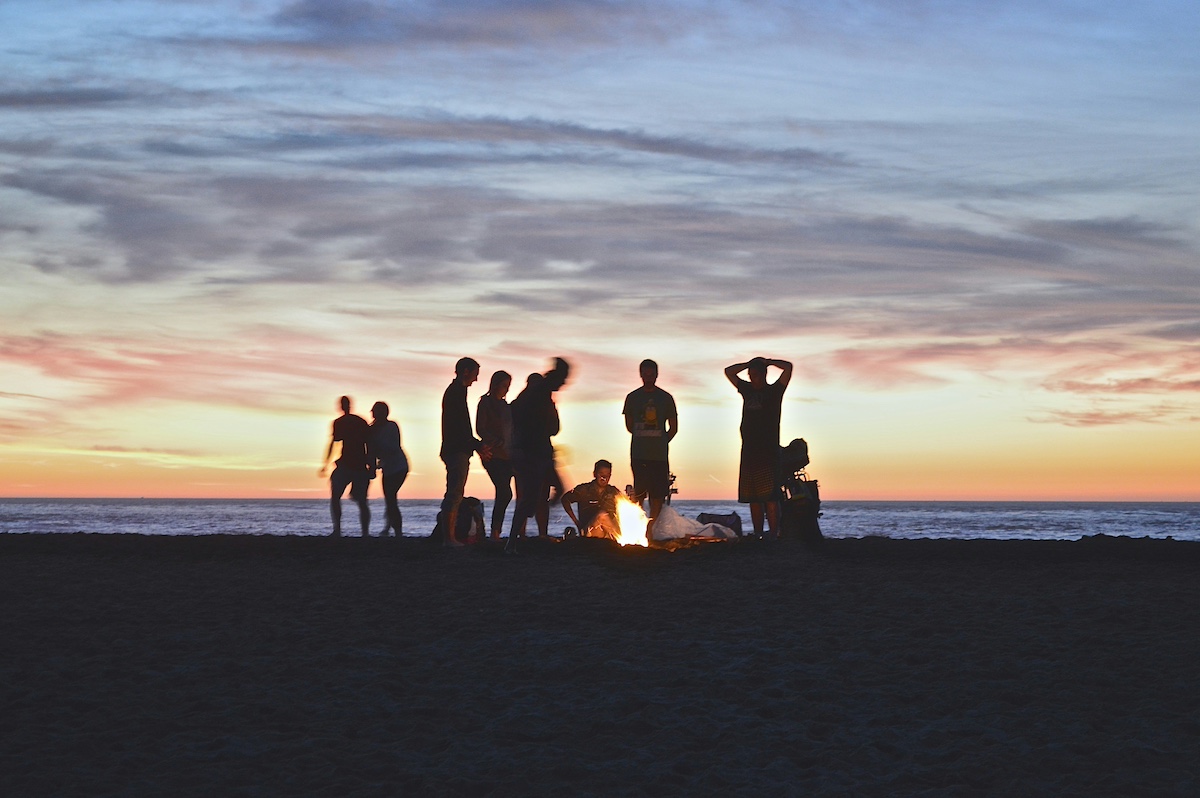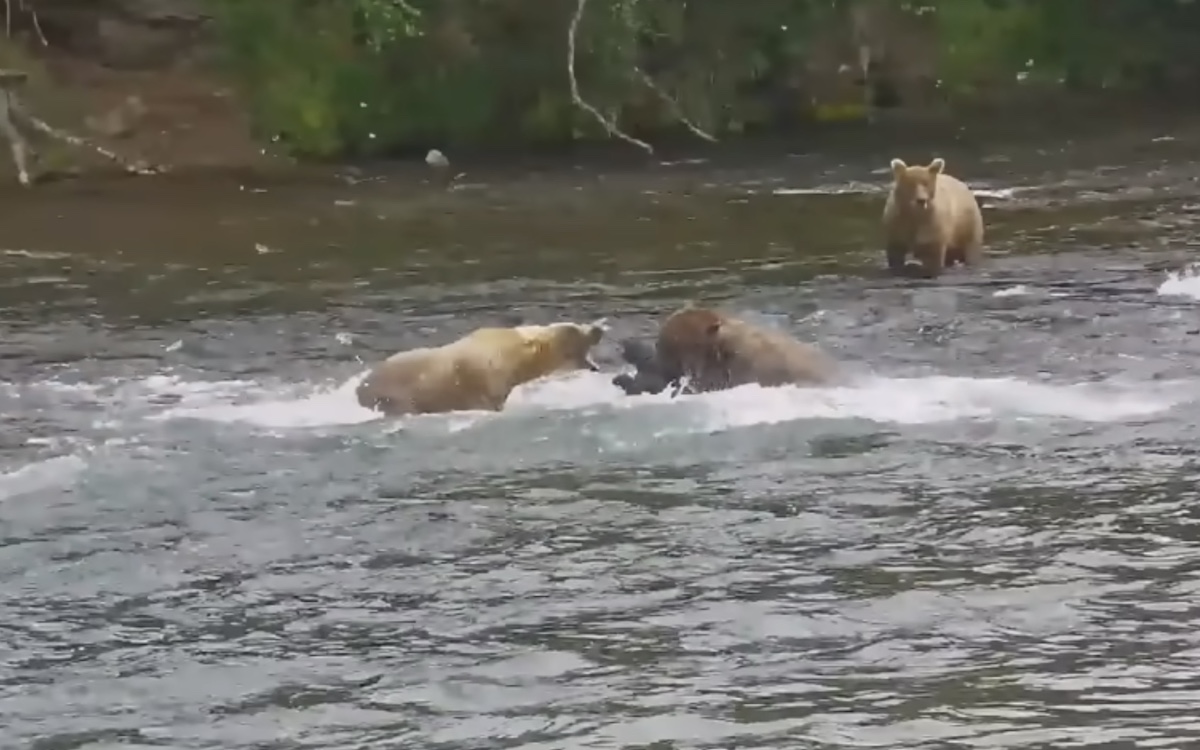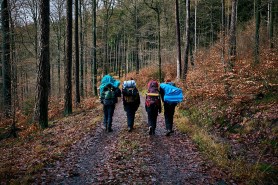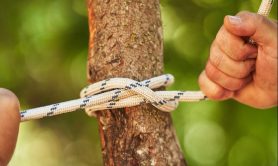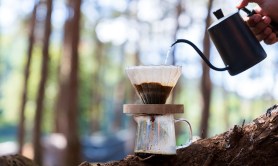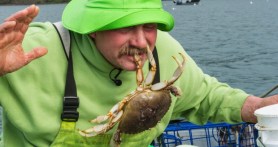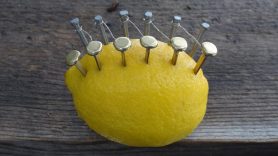

Are you debating buying a screen shelter as an addition to your camping kit? They make a ton of sense for tent campers, trailer campers, and RVer’s alike. Pitched over the picnic table at your campsite, the screen shelter will likely become the hub of activity for your campsite for all hours of the day you’re not sleeping. Heck, you might even decide to sleep in it. It’s also a great backyard addition anytime you want to be outdoors but not pestered by bugs or burned by the sun.
Videos by Outdoors with Bear Grylls
50 Campfires Number One Tip for choosing a screen shelter is to make sure you get one that’s big enough. It should be large enough to easily fit over the standard picnic table (which is eight feet long) with plenty of room to maneuver around it on all sides. The Quick-Set Escape by Clam is a perfect example. It’s 6-sided with a 12’x12’ footprint. An added benefit is it sets up in less than a minute and takes down even faster.
Drink – Enjoy Summer’s Beer
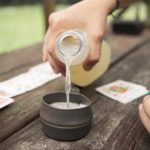 The word “radler” in German means “cyclist,” but we’ve come to know a radler as a summer beer. It makes sense because citrus blended beers are served as kind of a refreshing sports drink at German “beirstubes” frequented by cyclists. In English, the beverage is called a shandy.
The word “radler” in German means “cyclist,” but we’ve come to know a radler as a summer beer. It makes sense because citrus blended beers are served as kind of a refreshing sports drink at German “beirstubes” frequented by cyclists. In English, the beverage is called a shandy.
With craft brewers turning out so many seasonal beers these days, finding canned radlers and shandys is easy. Buy a selection, keep them good and cold, and you and your friends can while away happy hours sampling, discussing, and posting your picks and pans on your favorite social media platform. We’d love to hear about them at 50 Campfires.
You can also develop your own radlers and shandys. Start with your favorite hoppy pale lager or a light IPA. You can try adding various ratios of lemon lime soda or go more exotic with grapefruit juice, sparkling soda, and a dash of salt. Try the citrus juices you like and cut them with enough seltzer water to give them fizz. You might even try adding some gin, vodka, or tequila for an extra kick.
Eat – Campsite Fondue
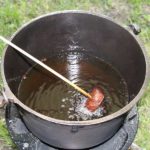 Heat up cooking oil (peanut oil is best) over a camp stove like the EcoZoom portable rocket stove. Use a small, but heavy cast iron kettle on top so that it heats the oil evenly rather than creating a hotspot over the flame. A deep, round bottom kettle works best. Don’t fill it too full—about 1/3 to ½ works best and helps avoid too much spattering. Get the oil temp up to 350-375 F, but no hotter.
Heat up cooking oil (peanut oil is best) over a camp stove like the EcoZoom portable rocket stove. Use a small, but heavy cast iron kettle on top so that it heats the oil evenly rather than creating a hotspot over the flame. A deep, round bottom kettle works best. Don’t fill it too full—about 1/3 to ½ works best and helps avoid too much spattering. Get the oil temp up to 350-375 F, but no hotter.
Cut up pieces of sausage, hotdog, cheese, organ meats, shrimp, vegetables, or mushrooms, etc. into small chunks and have a deep fry in the heated oil one piece at a time. It’s a campsite fondue.
Cut up the ingredients from 2-24 hours ahead of time and marinate them in your favorite flavors in heavy duty zipper bags in the iced cooler. Make sure you lay in a supply of bamboo skewers at least 12 inches long, too. Then you’re instantly ready to cook any time you want to heat up the oil.
Here are some ideas:
- Shrimp: mince 3-4 cloves of garlic. Add to the bag with olive oil and a dash of cayenne pepper. Seal the bag and massage it well.
- Tenderloin Chunks: add olive oil, yellow mustard, lemon juice, and soy sauce to the bag. Work it in well and let it set at least overnight.
- Cheese: cubes of cheese actually work better than cheese curds for this. Cut them to about ¾-inch cubes. Make sure they are really cold, but not quite frozen for best results. Getting the timing just right on these takes some experimenting, but once you do they are ooey, gooey delicious.
- Mushrooms: they are so simple. Just quarter large whole button mushrooms, skewer, and fry.
- Sweet Potato: cube them to about ¾-inch size. Skewer and deep fry. These take longer than most to cook all the way through. Sprinkle with cinnamon and/or brown sugar when they are done.
- Experiment: you can cook about anything you can get on the skewer this way. However, use caution. The wetter the ingredient is, the more it will spatter when immersed in the hot oil. This will subside as the item begins to cook.
Play Cards – Four Card Golf
 Golf is a card game for two to six players. Like golf, the object is to score as low as possible. In front of each player is a layout of cards arranged in a square or rectangle, and players improve their scores by drawing new cards to replace unwanted cards, which they discard. Each deal is seen as the equivalent of a hole so a game consists of either 9 or 18 deals. The player with the lowest score at the end of the agreed upon number of deals is the winner.
Golf is a card game for two to six players. Like golf, the object is to score as low as possible. In front of each player is a layout of cards arranged in a square or rectangle, and players improve their scores by drawing new cards to replace unwanted cards, which they discard. Each deal is seen as the equivalent of a hole so a game consists of either 9 or 18 deals. The player with the lowest score at the end of the agreed upon number of deals is the winner.
Using a well-shuffled, standard 52-card the dealer deals four cards to each player. Each player’s cards are to be arranged face down in a square. The remaining cards are placed face-down in a stack at the center of the table. The top card in the pile is turned up and becomes the discard pile. Each player may look once at the two nearest cards of his or her square layout, without showing them to anyone else. After this, the layout cards may not be looked at again until they are discarded during play or scored at the end of the play.
Player to the dealer’s left starts, and play moves clockwise. At your turn you must either draw the top card from the face-down stack, draw the top discard, or knock to signal end of play.
- If you draw a card, you may use it to replace one of the four cards of your layout, but you are notallowed to look at any of your layout cards before deciding which to replace. You place the drawn card face-down in your layout, being careful to remember what it is, and discard the card that previously occupied that position. It goes face-up on top of the discard pile. It is then the next player’s turn.
- If you draw a card and decide you do not want to use it in your layout, you may simply discard the drawn card face up on the discard pile, and it is the next player’s turn. However, if you choose to take the discard, you mustuse it to replace one of your layout cards – you cannot simply put it back on the discard pile, leaving the situation as it was.
- If you knock, you do nothing else in your turn. Each of the other players in order has one more normal turn and then the play ends.
Note that if you look at any face down card in your layout, that card must be discarded replaced with the card you drew. There is no way to check the value of a face down card and leave it in place.
At the end of the play, each player’s square of four cards is turned face-up and scored as follows.
- Each numeral card scores face value (Ace=1, Two=2, etc.)
- Each Jack or Queen scores 10 points.
- Each King scores zero points.
The player who has the lowest cumulative score after 9 (or 18) deals wins.
Get Ready – For Fishing
 There are a thousand campsite tasks most pleasantly done while you’re outdoors, but still protected from bugs and direct sun. The large size of a unit like the Quick-Set Escape by Clam makes it easy to work on the rods, string the line, tie on rigs, sharpen hooks and more. Best of all, you can do it day or night as the mood strikes!
There are a thousand campsite tasks most pleasantly done while you’re outdoors, but still protected from bugs and direct sun. The large size of a unit like the Quick-Set Escape by Clam makes it easy to work on the rods, string the line, tie on rigs, sharpen hooks and more. Best of all, you can do it day or night as the mood strikes!
Check out how to tie some basic rigs for catching catfish in 50 Campfires video. You can also learn how to make camping friendly catfish bait in another great video tip from Field Trip: Great River Road.
Chill – Listen to Tunes
 You can enjoy fun and games … and great music … in a listening party. With a Bluetooth speaker set up on picnic table pass your phone or notebook back and forth with Spotify.
You can enjoy fun and games … and great music … in a listening party. With a Bluetooth speaker set up on picnic table pass your phone or notebook back and forth with Spotify.
Each player has to pick a song somehow “related” to the last one played. For example, maybe it has to be in a genre the player considers “opposite” of the last song played; the final word of the lyric has to be in the title of the next song; the song has to have been released in the year plus or minus 7 or 11 years from the year of release of the last song.
You can make up whatever rules you want, but a listening party can involve everyone in camp from kids to grampa and grandma … and they’ll all learn about the other players’ musical tastes.
